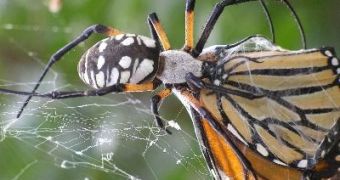The link between the Earth and space projects gets a new, more mundane valency, as hundreds of K-12 students from the University of Colorado in Boulder will get to participate in a biology experiment taking place aboard the International Space Station. More specifically, they will be involved in a thorough observation and comparison study involving butterflies and spiders and their behavior in zero-gravity conditions.
This is supposed to draw or increase the interest of children towards science in general. The insect-filled payload will be carried to the ISS aboard the space shuttle Endeavour which is set to be launched on the 14th of this month, the third in a series of such tests in the educational program. The first part of the experiment will focus on the feeding habit alteration of web-spinning spiders in a weightless environment, comparing to those remaining in the school laboratories on Earth.
A second stage of the study will observe the behavior of lady butterfly specimens during their entire life. The four-day old butterfly pupae will be placed aboard the ISS and monitored from the Earth by means of downlink video, images and data provided by the space station. Future payloads for experiments of this kind are planned to be squeezed aboard space shuttles with ISS as a destination during the remaining time until the retirement of the space fleet.
"Between now and then, we are seeking sponsors for our educational payloads to enhance the learning opportunities for the K-12 community in Colorado and around the world," shared the payload mission manager from BioServe (the non-profit, NASA-financed institution which makes these tests possible), Stefanie Countryman, cited by Universe Today. "This program is an excellent example of using a national asset like the International Space Station to inspire K-12 students in science, technology, engineering and math," added Louis Stodieck, BioServe's Director and main project investigator.

 14 DAY TRIAL //
14 DAY TRIAL //